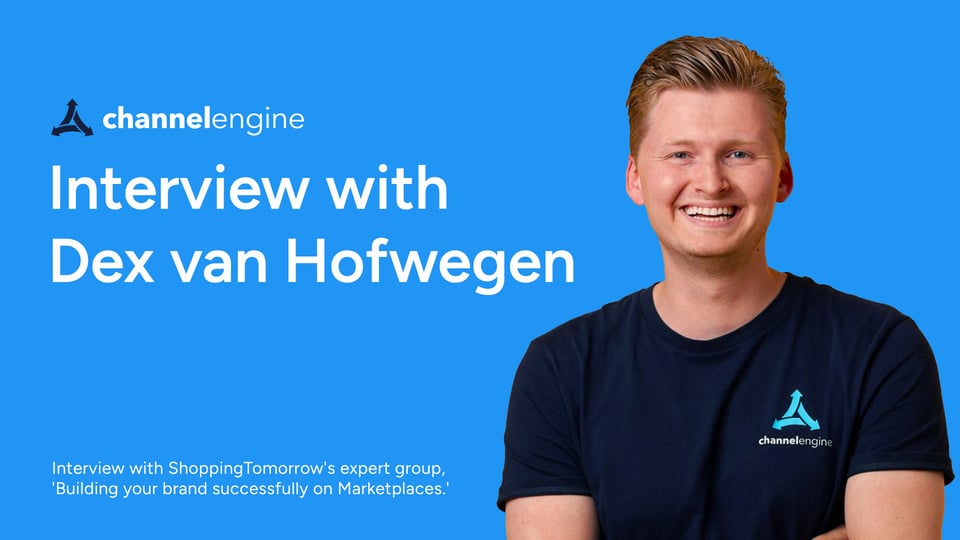How and why should brands differentiate themselves from competitors?

-
ShoppingTomorrow is an annual program with over 500 digital commerce professionals.
-
Every year there are different expert groups that each investigate a specific question, development, or trend.
-
In this expert group, hosted by ChannelEngine and bol.com, various marketplace experts come together to discuss how companies can successfully build their brands on different marketplaces and digital sales channels.
-
In the end, each expert group writes a blue paper with practical tips and insights that will help you grow your business further.
"It is more important than ever to distinguish yourself as a brand on marketplaces."
- Dex van Hofwegen, ChannelEngine
Want to know how to successfully grow your brand using marketplaces? That topic is exactly what Dex van Hofwegen, Director of Sales (EMEA) at ChannelEngine, is examining in this interview with Sophie Nijhout from bol.com and Emile Valkestijn from 10XCREW. This interview came from ShoppingTomorrow's expert group, 'Building your brand successfully on Marketplaces.'
Dex, what expertise do you add to the marketplace expert group?
"In recent years, I have helped about 600 different brands, distributors, and retailers at ChannelEngine to sell via marketplaces and determine a strategy for this. I have a good idea of what motivates these brands to take this step (selling on marketplaces) and the challenges they encounter regarding content, profitability, and logistics."
Why is the question about companies building their brand on marketplaces so relevant?
"With more and more companies offering their products through marketplaces, it is becoming increasingly important to be distinctive as a brand. In general, there are two strategies you can apply to marketplaces: being the cheapest or offering the best brand experience.
Brands betting on a low price compete with other brands doing the same thing — and eventually they go too low, which is a problem. Therefore, investing in a good brand experience makes more sense in the long term. We also see that online buyers find the brand experience very important; they look for the right price-quality ratio and are willing to pay more for a high-quality and strong brand. These insights are supported by research from GfK, which will be published this summer. By focusing on your brand experience, you create loyalty and continue to distinguish yourself in the long term."
What challenges do entrepreneurs face in practice? And what solutions do you offer?
"Many businesses begin by selling via their own shop or a webshop, and then want to expand by selling on marketplaces and digital sales channels. They often find it difficult to translate their brand image and brand value to marketplaces. In addition, each marketplace has a unique target audience, and it is not always clear which buyers you reach with which marketplace. If there is a mismatch, products may be returned frequently, not sell, or remain in the marketplace’s warehouse.
To help entrepreneurs with this, we have Marketplace Partner Managers at ChannelEngine who work closely with the various marketplaces. This gives them a good insight into what works and does not work on a specific marketplace. Together with our Customer Success team, they help our customers to offer the right products in the right marketplace.
At bol.com, for example, there are white and gray spots. These spots refer to two untapped avenues for sellers: products that aren't listed or available on these marketplaces yet, but that customers are still searching for, and offers that exist but aren't attractive enough to consumers. We then send our customers to take advantage of this dual opportunity to list those products which aren't available yet and/or use bundles to create more attractive offers for consumers.
This close cooperation with marketplaces is a win-win situation: the marketplaces get more relevant products and content while the entrepreneur earns more profit because the right products are offered — products that appeal to the target group. Therefore, these products are returned less often and cost less in marketing because customers are actively looking for these products."
How does ChannelEngine help facilitate a healthy channel mix?
"A mistake many entrepreneurs make is to offer all their products at once through all channels. This creates an unhealthy channel mix. For example, you first need to identify the gray areas on the marketplace, which kind of buyers shop there, the commission the channel charges, and what a fulfillment solution costs. Only then can you determine whether it makes sense to sell a certain item or not. You can then easily select the right products for the right channels via ChannelEngine's software.
In addition, it works very well to create a unique online-only or marketplace-only offer tailored to specific marketplaces. We do this, for example, in collaboration with bol.com. The bol.com account managers indicate which items sell well in sets, and we identify the products with a lot of competition. We then advise our customers to create virtual bundles for certain products, where the product information is automatically filled via Generative AI. This way, as a brand, you create a unique scalable offer that meets the buyers' demand and suits your needs."
What happens at the ShoppingTomorrow final sprint event?
"The final sprint is one of the events of the ShoppingTomorrow research year. During the final sprint, all expert groups complete their research, and we dot the i's and cross the t's for the blue papers we will write.
Our expert group will try to find an answer to the main question based on four cases, including bol.com's partners. Each of these companies has a specific challenge, and together with the other experts from our group, we'll look for a solution. Our approach is very practical, and we are already implementing possible solutions. In the final sprint, we check whether our KPIs have been achieved and whether our hypothesis was correct."
The result is a blue paper. Why should brand owners read this?
"In our blue paper, you will find the case studies we've worked on this year. These are practical, real-life examples with insights that you can apply immediately. Because the cases are so diverse and tangible, every entrepreneur will get useful tips from them. I recommend anyone who wants to build a brand through marketplaces to download our blue paper in October."
Curious about last year's blue papers? You can find them here.
Dex van Hofwegen is the Director of Sales (EMEA) at ChannelEngine.

ChannelEngine is an integration partner that helps brands scale globally on marketplaces with other ecommerce automation, profit-generating features, and in-house marketplace experts to make ecommerce entrepreneurs successful faster. Dex's sales team is spread across Europe with colleagues from ten different nationalities.
This interview originally appeared on bol.com’s partner platform and has been translated from Dutch and lightly edited for clarity.


